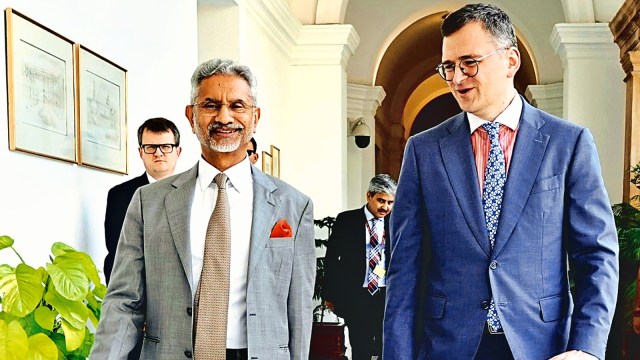Faced with the new geo-political reality of US-Russia direct talks on Ukraine and the rapidly changing contours of the US-Europe trans-Atlantic alliance, India has nuanced its position on the war: moving from “two parties to the conflict” to “parties concerned”.
The US and Russian delegations, led by their Foreign Ministers, met in Riyadh this week to discuss the path to end the war, Ukraine wasn’t at that table. This has rattled Europe as it upends US policy under the Biden administration that had said that nothing on Ukraine will be done without Ukraine being part of the negotiations.

In the light of the changed circumstances, India’s position was articulated by External Affairs minister S Jaishankar late Thursday hours after his meeting with Russian Foreign minister Sergey Lavrov. “Regarding the Ukraine conflict, we have long advocated dialogue and diplomacy. Today, the world expects that parties concerned deal with each other to end the war.” He was speaking at the G20 Foreign Ministers meeting in Johannesburg in South Africa on the global geo-political situation.
Story continues below this ad
This is a shift from what Pavan Kapoor, the Indian representative at the Peace summit on Ukraine organised by Switzerland, had said on June 16, 2024. Kapoor, then Secretary in the Ministry of External Affairs and now Deputy NSA, had said, “We continue to believe that such a peace requires bringing together all stakeholders and a sincere and practical engagement between the two parties to the conflict… Accordingly, we will continue to engage with all stakeholders as well as the two parties to the conflict to contribute to all earnest efforts to achieve lasting peace in Ukraine.”
Jaishankar’s statement Thursday doesn’t mention the “two parties to the conflict” — which is Russia and Ukraine. And only talks about “parties concerned.” This is a much broader term and which can include the US as well, with or without Europe.
Earlier, too there was a reference to stakeholders, but the insistence of the “two parties to the conflict” was explicit.
Sources said this is acknowledgement of the new geopolitical realities that New Delhi is confronted with and the imperative for diplomatic space as it navigates its way through this change.
Story continues below this ad
That task is cut out. At the Swiss peace conference, India did not sign the joint communique arguing that Russia was not at the table. It remains to be seen how India negotiates the present situation, in which Russia is at the table, but Ukraine is not.
India has not taken a side, and has always advocated dialogue and diplomacy to end the war. Prime Minister Narendra Modi famously advised President Putin that “this is not an era of war”; solutions can’t be found on the battlefield.
India has offered to contribute to any effort to bring the war to an end. Modi has visited both Moscow and Kyiv, met and spoken to both Putin and Zelenskyy several times in the last three years.
In fact, two days after he met US Secretary of State Marco Rubio in Riyadh to discuss an end to the war in Ukraine, Russian Foreign Minister Lavrov held talks Thursday with Jaishankar on the sidelines of the G20 ministerial in Johannesburg.
Story continues below this ad
In a post later on X, Jaishankar said, “Reviewed the continued progress of India-Russia bilateral cooperation. Discussed recent developments pertaining to the Ukraine conflict, including his Riyadh meeting. Agreed to remain in touch.”
The Russian Foreign Ministry, too, said that the two Foreign Ministers had held talks in Johannesburg.
Jaishankar was in the US last week from where he headed to the Munich Security Conference.
On February 15, a day after Prime Minister Narendra Modi met US President Donald Trump and said India is on the side of peace in the Russia-Ukraine war, Jaishankar had met Ukrainian Minister of Foreign Affairs Andrii Sybiha in Munich and discussed efforts to resolve the conflict.
Story continues below this ad
Thanking Jaishankar for “our meaningful meeting”, Sybiha said, “We are interested in developing relations with India and advancing cooperation in trade, technology, agriculture, security and other areas. We also rely on India’s strong global voice to bring a just and lasting peace closer.”









